Following the Damascus-Kurdish alliance, Syria may become the biggest defeat for the Central Intelligence Agency since Vietnam, says Pepe Escobar.
By Pepe Escobar
Special to Consortium News
 What is happening in Syria, following yet another Russia-brokered deal, is a massive geopolitical game-changer. I’ve tried to summarize it in a single paragraph this way:
What is happening in Syria, following yet another Russia-brokered deal, is a massive geopolitical game-changer. I’ve tried to summarize it in a single paragraph this way:
“It’s a quadruple win. The U.S. performs a face saving withdrawal, which Trump can sell as avoiding a conflict with NATO ally Turkey. Turkey has the guarantee – by the Russians – that the Syrian Army will be in control of the Turkish-Syrian border. Russia prevents a war escalation and keeps the Russia-Iran-Turkey peace process alive. And Syria will eventually regain control of the entire northeast.”
Syria may be the biggest defeat for the CIA since Vietnam.
Yet that hardly begins to tell the whole story.
Allow me to briefly sketch in broad historical strokes how we got here.
It began with an intuition I felt last month at the tri-border point of Lebanon, Syria and Occupied Palestine; followed by a subsequent series of conversations in Beirut with first-class Lebanese, Syrian, Iranian, Russian, French and Italian analysts; all resting on my travels in Syria since the 1990s; with a mix of selected bibliography in French available at Antoine’s in Beirut thrown in.
The Vilayets
Let’s start in the 19thcentury when Syria consisted of six vilayets — Ottoman provinces — without counting Mount Lebanon, which had a special status since 1861 to the benefit of Maronite Christians and Jerusalem, which was a sanjak (administrative division) of Istanbul.
The vilayets did not define the extremely complex Syrian identity: for instance, Armenians were the majority in the vilayet of Maras, Kurds in Diyarbakir – both now part of Turkey in southern Anatolia – and the vilayets of Aleppo and Damascus were both Sunni Arab.
Nineteenth century Ottoman Syria was the epitome of cosmopolitanism. There were no interior borders or walls. Everything was inter-dependent.
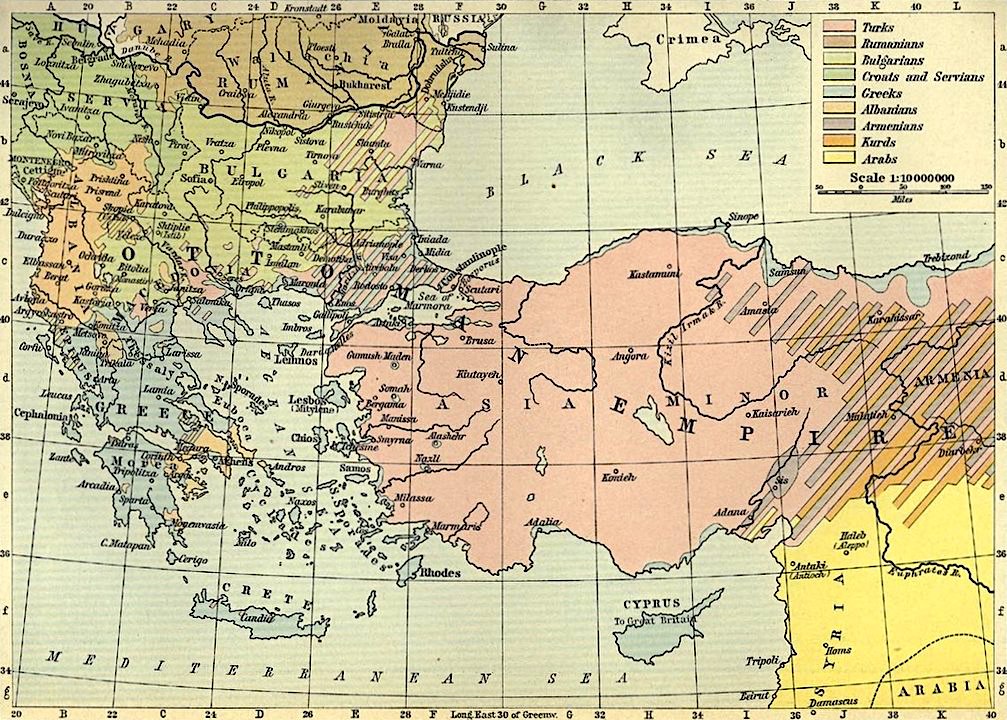
Ethnic groups in the Balkans and Asia Minor, early 20th Century, Historical Atlas, 1911.
Then the Europeans, profiting from World War I, intervened. France got the Syrian-Lebanese littoral, and later the vilayets of Maras and Mosul (today in Iraq). Palestine was separated from Cham (the “Levant”), to be internationalized. The vilayet of Damascus was cut in half: France got the north, the Brits got the south. Separation between Syria and the mostly Christian Lebanese lands came later.
There was always the complex question of the Syria-Iraq border. Since antiquity, the Euphrates acted as a barrier, for instance between the Cham of the Umayyads and their fierce competitors on the other side of the river, the Mesopotamian Abbasids.
James Barr, in his splendid “A Line in the Sand,” notes, correctly, that the Sykes-Picot agreement imposed on the Middle East the European conception of territory: their “line in the sand” codified a delimited separation between nation-states. The problem is, there were no nation-states in region in the early 20thcentury.
>>Please Donate to Consortium News’ Fall Fund Drive<<
The birth of Syria as we know it was a work in progress, involving the Europeans, the Hashemite dynasty, nationalist Syrians invested in building a Greater Syria including Lebanon, and the Maronites of Mount Lebanon. An important factor is that few in the region lamented losing dependence on Hashemite Medina, and except the Turks, the loss of the vilayet of Mosul in what became Iraq after World War I.
In 1925, Sunnis became the de facto prominent power in Syria, as the French unified Aleppo and Damascus. During the 1920s France also established the borders of eastern Syria. And the Treaty of Lausanne, in 1923, forced the Turks to give up all Ottoman holdings but didn’t keep them out of the game.
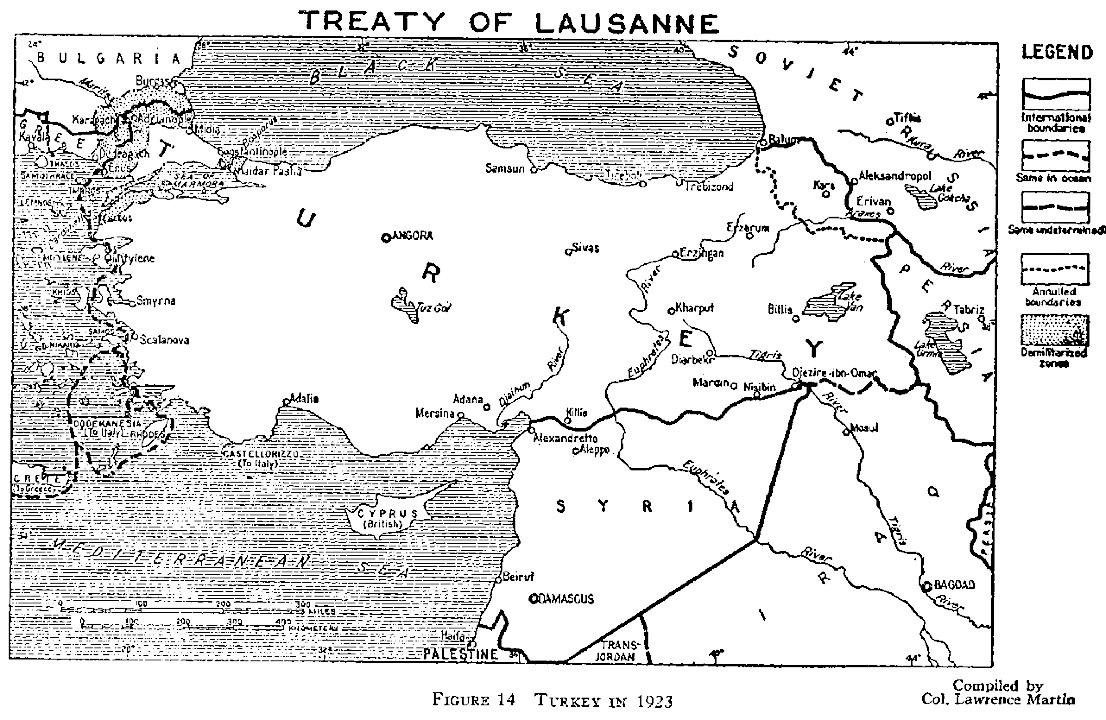
Turkish borders according to the Treaty of Lausanne, 1923.
The Turks soon started to encroach on the French mandate, and began blocking the dream of Kurdish autonomy. France in the end gave in: the Turkish-Syrian border would parallel the route of the fabled Bagdadbahn — the Berlin-Baghdad railway.
In the 1930s France gave in even more: the sanjak of Alexandretta (today’s Iskenderun, in Hatay province, Turkey), was finally annexed by Turkey in 1939 when only 40 percent of the population was Turkish.
The annexation led to the exile of tens of thousands of Armenians. It was a tremendous blow for Syrian nationalists. And it was a disaster for Aleppo, which lost its corridor to the Eastern Mediterranean.

Turkish forces under entered Alexandretta on July 5, 1938.
To the eastern steppes, Syria was all about Bedouin tribes. To the north, it was all about the Turkish-Kurdish clash. And to the south, the border was a mirage in the desert, only drawn with the advent of Transjordan. Only the western front, with Lebanon, was established, and consolidated after WWII.
This emergent Syria — out of conflicting Turkish, French, British and myriad local interests —obviously could not, and did not, please any community. Still, the heart of the nation configured what was described as “useful Syria.” No less than 60 percent of the nation was — and remains — practically void. Yet, geopolitically, that translates into “strategic depth” — the heart of the matter in the current war.
From Hafez to Bashar
Starting in 1963, the Baath party, secular and nationalist, took over Syria, finally consolidating its power in 1970 with Hafez al-Assad, who instead of just relying on his Alawite minority, built a humongous, hyper-centralized state machinery mixed with a police state. The key actors who refused to play the game were the Muslim Brotherhood, all the way to being massacred during the hardcore 1982 Hama repression.
Secularism and a police state: that’s how the fragile Syrian mosaic was preserved. But already in the 1970s major fractures were emerging: between major cities and a very poor periphery; between the “useful” west and the Bedouin east; between Arabs and Kurds. But the urban elites never repudiated the iron will of Damascus: cronyism, after all, was quite profitable.
Damascus interfered heavily with the Lebanese civil war since 1976 at the invitation of the Arab League as a “peacekeeping force.” In Hafez al-Assad’s logic, stressing the Arab identity of Lebanon was essential to recover Greater Syria. But Syrian control over Lebanon started to unravel in 2005, after the murder of former Lebanese Prime Minister Rafiq Hariri, very close to Saudi Arabia, the Syrian Arab Army (SAA) eventually left.
Bashar al-Assad had taken power in 2000. Unlike his father, he bet on the Alawites to run the state machinery, preventing the possibility of a coup but completely alienating himself from the poor, Syrian on the street.
What the West defined as the Arab Spring, began in Syria in March 2011; it was a revolt against the Alawites as much as a revolt against Damascus. Totally instrumentalized by the foreign interests, the revolt sprang up in extremely poor, dejected Sunni peripheries: Deraa in the south, the deserted east, and the suburbs of Damascus and Aleppo.
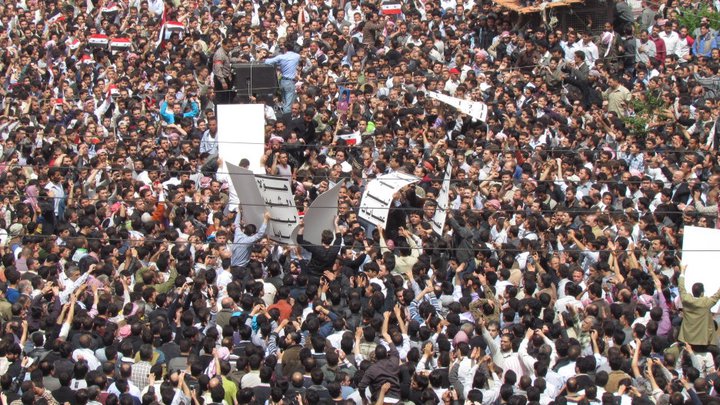
Protest in Damascus, April 24, 2011. (syriana2011/Flickr)
What was not understood in the West is that this “beggars banquet” was not against the Syrian nation, but against a “regime.” Jabhat al-Nusra, in a P.R. exercise, even broke its official link with al-Qaeda and changed its denomination to Fatah al-Cham and then Hayat Tahrir al-Cham (“Organization for the Liberation of the Levant”). Only ISIS/Daesh said they were fighting for the end of Sykes-Picot.
By 2014, the perpetually moving battlefield was more or less established: Damascus against both Jabhat al-Nusra and ISIS/Daesh, with a wobbly role for the Kurds in the northeast, obsessed in preserving the cantons of Afrin, Kobane and Qamichli.
But the key point is that each katiba (“combat group”), each neighborhood, each village, and in fact each combatant was in-and-out of allegiances non-stop. That yielded a dizzying nebulae of jihadis, criminals, mercenaries, some linked to al-Qaeda, some to Daesh, some trained by the Americans, some just making a quick buck.
For instance Salafis — lavishly financed by Saudi Arabia and Kuwait — especially Jaish al-Islam, even struck alliances with the PYD Kurds in Syria and the jihadis of Hayat Tahrir al-Cham (the remixed, 30,000-strong al-Qaeda in Syria). Meanwhile, the PYD Kurds (an emanation of the Turkish Kurds’ PKK, which Ankara consider “terrorists”) profited from this unholy mess — plus a deliberate ambiguity by Damascus – to try to create their autonomous Rojava.
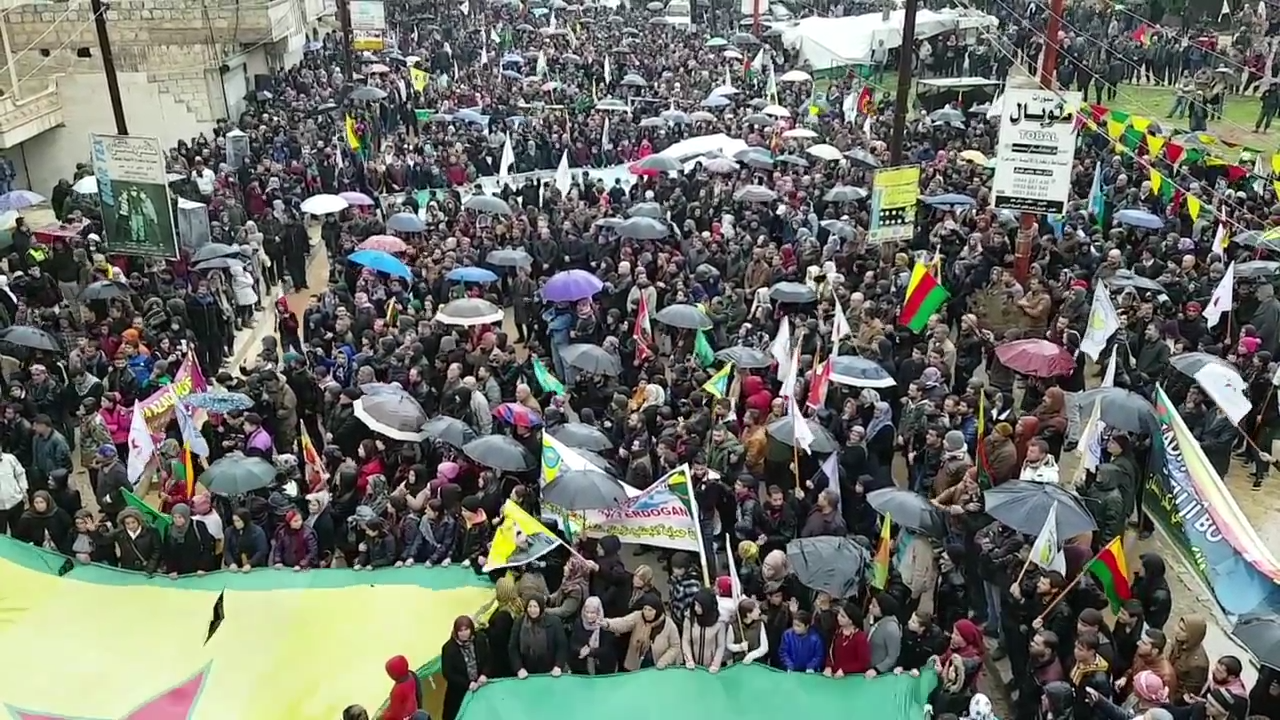
A demonstration in the city of Afrin in support of the YPG against the Turkish invasion of Afrin, Jan. 19, 2018. (Voice of America Kurdish, Wikimedia Commons)
That Turkish Strategic Depth
Turkey was all in. Turbo-charged by the neo-Ottoman politics of former Foreign Minister Ahmet Davutoglu, the logic was to reconquer parts of the Ottoman empire, and get rid of Assad because he had helped PKK Kurdish rebels in Turkey.
Davutoglu’s Strategik Derinlik (“Strategic Depth’), published in 2001, had been a smash hit in Turkey, reclaiming the glory of eight centuries of an sprawling empire, compared to puny 911 kilometers of borders fixed by the French and the Kemalists. Bilad al Cham, the Ottoman province congregating Lebanon, historical Palestine, Jordan and Syria, remained a powerful magnet in both the Syrian and Turkish unconscious.
No wonder Turkey’s Recep Erdogan was fired up: in 2012 he even boasted he was getting ready to pray in the Umayyad mosque in Damascus, post-regime change, of course. He has been gunning for a safe zone inside the Syrian border — actually a Turkish enclave — since 2014. To get it, he has used a whole bag of nasty players — from militias close to the Muslim Brotherhood to hardcore Turkmen gangs.
With the establishment of the Free Syrian Army (FSA), for the first time Turkey allowed foreign weaponized groups to operate on its own territory. A training camp was set up in 2011 in the sanjakof Alexandretta. The Syrian National Council was also created in Istanbul – a bunch of non-entities from the diaspora who had not been in Syria for decades.
Ankara enabled a de facto Jihad Highway — with people from Central Asia, Caucasus, Maghreb, Pakistan, Xinjiang, all points north in Europe being smuggled back and forth at will. In 2015, Ankara, Riyadh and Doha set up the dreaded Jaish al-Fath (“Army of Conquest”), which included Jabhat al-Nusra (al-Qaeda).
At the same time, Ankara maintained an extremely ambiguous relationship with ISIS/Daesh, buying its smuggled oil, treating jihadis in Turkish hospitals, and paying zero attention to jihad intel collected and developed on Turkish territory. For at least five years, the MIT — Turkish intelligence – provided political and logistic background to the Syrian opposition while weaponizing a galaxy of Salafis. After all, Ankara believed that ISIS/Daesh only existed because of the “evil” deployed by the Assad regime.
The Russian Factor
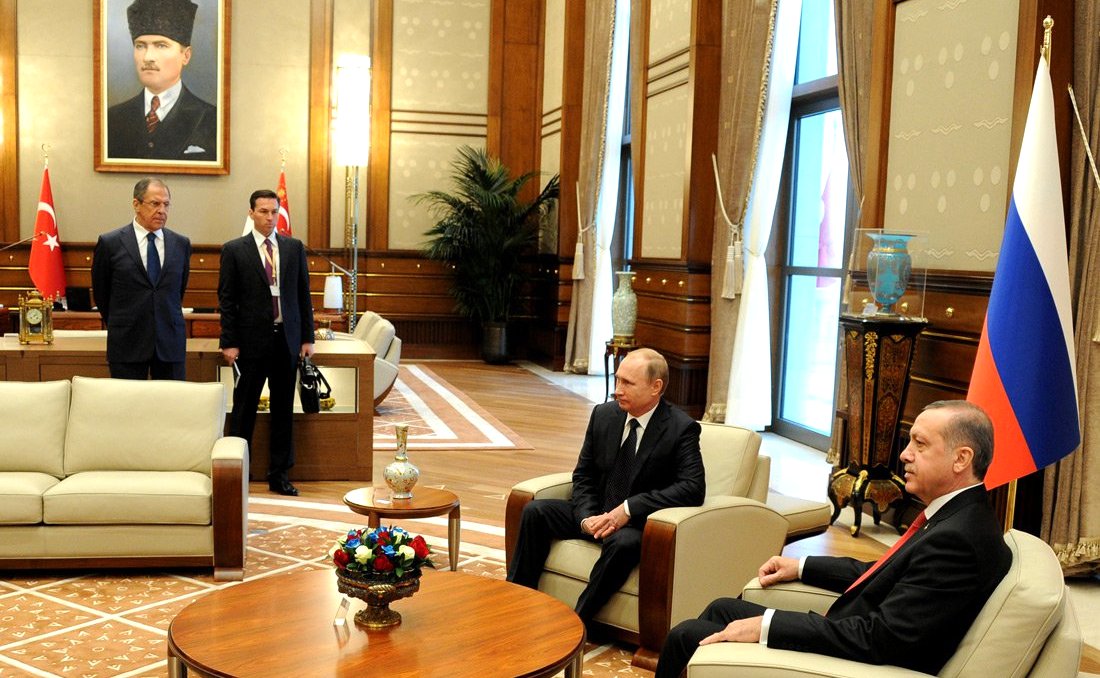
Russian President Vladiimir Putin meeting with President of Turkey Recep Erdogan; Russian Minister of Foreign Affairs Sergei Lavrov standing in background, Ankara, Dec. 1, 2014 Ankara. (Kremlin)
The first major game-changer was the spectacular Russian entrance in the summer of 2015. Vladimir Putin had asked the U.S. to join in the fight against the Islamic State as the Soviet Union allied against Hitler, negating the American idea that this was Russia’s bid to restore its imperial glory. But the American plan instead, under Barack Obama, was single-minded: betting on a rag-tag Syrian Democratic Forces (SDF), a mix of Kurds and Sunni Arabs, supported by air power and U.S. Special Forces, north of the Euphrates, to smash ISIS/Daesh all the way to Raqqa and Deir ez-Zor.
Raqqa, bombed to rubble by the Pentagon, may have been taken by the SDF, but Deir ez-Zor was taken by Damascus’s Syrian Arab Army. The ultimate American aim was to consistently keep the north of the Euphrates under U.S. power, via their proxies, the SDF and the Kurdish PYD/YPG. That American dream is now over, lamented by imperial Democrats and Republicans alike.
The CIA will be after Trump’s scalp till Kingdom Come.
Kurdish Dream Over
Talk about a cultural misunderstanding. As much as the Syrian Kurds believed U.S. protection amounted to an endorsement of their independence dreams, Americans never seemed to understand that throughout the “Greater Middle East” you cannot buy a tribe. At best, you can rent them. And they use you according to their interests. I’ve seen it from Afghanistan to Iraq’s Anbar province.
The Kurdish dream of a contiguous, autonomous territory from Qamichli to Manbij is over. Sunni Arabs living in this perimeter will resist any Kurdish attempt at dominance.
The Syrian PYD was founded in 2005 by PKK militants. In 2011, Syrians from the PKK came from Qandil – the PKK base in northern Iraq – to build the YPG militia for the PYD. In predominantly Arab zones, Syrian Kurds are in charge of governing because for them Arabs are seen as a bunch of barbarians, incapable of building their “democratic, socialist, ecological and multi-communitarian” society.

Kurdish PKK guerillas In Kirkuk, Iraq. (Kurdishstruggle via Flickr)
One can imagine how conservative Sunni Arab tribal leaders hate their guts. There’s no way these tribal leaders will ever support the Kurds against the SAA or the Turkish army; after all these Arab tribal leaders spent a lot of time in Damascus seeking support from Bashar al-Assad. And now the Kurds themselves have accepted that support in the face of the Trukish incursion, greenlighted by Trump.
East of Deir ez-Zor, the PYD/YPG already had to say goodbye to the region that is responsible for 50 percent of Syria’s oil production. Damascus and the SAA now have the upper hand. What’s left for the PYD/YPG is to resign themselves to Damascus’s and Russian protection against Turkey, and the chance of exercising sovereignty in exclusively Kurdish territories.
Ignorance of the West
The West, with typical Orientalist haughtiness, never understood that Alawites, Christians, Ismailis and Druze in Syria would always privilege Damascus for protection compared to an “opposition” monopolized by hardcore Islamists, if not jihadis. The West also did not understand that the government in Damascus, for survival, could always count on formidable Baath party networks plus the dreaded mukhabarat — the intel services.
Rebuilding Syria
The reconstruction of Syria may cost as much as $200 billion. Damascus has already made it very clear that the U.S. and the EU are not welcome. China will be in the forefront, along with Russia and Iran; this will be a project strictly following the Eurasia integration playbook — with the Chinese aiming to revive Syria’s strategic positioning in the Ancient Silk Road.
As for Erdogan, distrusted by virtually everyone, and a tad less neo-Ottoman than in the recent past, he now seems to have finally understood that Bashar al-Assad “won’t go,” and he must live with it. Ankara is bound to remain imvolved with Tehran and Moscow, in finding a comprehensive, constitutional solution for the Syrian tragedy through the former “Astana process”, later developed in Ankara.
The war may not have been totally won, of course. But against all odds, it’s clear a unified, sovereign Syrian nation is bound to prevail over every perverted strand of geopolitical molotov cocktails concocted in sinister NATO/GCC labs. History will eventually tell us that, as an example to the whole Global South, this will remain the ultimate game-changer.
Pepe Escobar, a veteran Brazilian journalist, is the correspondent-at-large for Hong Kong-based Asia Times. His latest book is “2030.” Follow him on Facebook.
Before commenting please read Robert Parry’s Comment Policy. Allegations unsupported by facts, gross or misleading factual errors and ad hominem attacks, and abusive or rude language toward other commenters or our writers will be removed. If your comment does not immediately appear, please be patient as it is manually reviewed. For security reasons, please refrain from inserting links in your comments.
>>Please Donate to Consortium News’ Fall Fund Drive<<

So much is about oil. Trump recently said he was keeping some soldiers in Syria to protect the oil interests. Back about 15 years ago the American soldiers in Iraq were protecting the oil business buildings whilst nearby, the museum with valuable artifacts was being looted and nobody seemed to give a hoot.
The Turkish invasion has exposed some realities 1. The Kurds are no longer invisible to the world. 2. Turkey has had action taken against it by other nations. 3. American occupation is always a two-edged sword. American imperialism will never resolve the issue of Kurdish unification and independence. 4. Syria is not a big regional player after the civil war without Russia as a patron.
The invasion has blanked out the screen in regards to Baghdad’s assaults on the Kurdish Autonomous Region in Iraq. It has established the regional character of the conflict at great cost again to the Kurdish people. Some of this comes from the invasion of Iraq. Some of it comes from the personna of Erdogan and political Islamism. Some of it is the continued conflict regarding the political divisions of the region after WW1 by England and France. Rojava is in fact the smallest territory of Kurdistan.
Kurdish mayors in Turkey continue to be arrested. Turkish police have detained 418 people in 29 provinces. Baghdad and Popular Mobilization Units continue to attack Kurds and undermine the Kurdish Regional Government there in Iraq. Syria continues to claim sovereignty over Rojava and will exact its own toll. Iran routinely bombs Kurds in Iraq and elsewhere and promotes Sh’ia militias. Salih Muslim, leader of the PYD, stated in December that Syrian Kurds were never under the protection of American troops and that they were prepared to defend themselves. This is not the end of the Kurdish struggle. What’s done is done, the road is forward.
What a convoluted region.
Pity the suffering civilians.
Well written summary,Pepe.
Thank you for the history lesson. A very messy situation. Russia is diplomatically very active in the region to bring the warring parties at the negotiating table.
Wonderful piece. So helpful to get at least a somewhat better grasp on the history of the region. Thank you.
Pepe’s stuff is great as usual, the go-to journalist for geopolitics.
Not sure that the CIA lost Vietnam though; that was a Pentagon war, even if the CIA was involved. The CIA clearly lost Iran but Vietnam was nothing like that. Nor did the Pentagon ‘lose’ Vietnam.
The U.S. was fighting an ugly war of attrition and essentially ran out of money; a political failure.
Wars of attrition are never winnable. Any successful and intelligent military man will tell you so. After recently reading ” a Rumor Of War a true memoir of the Viet Nam Fiasco and how it was prosecuted it is no wonder why it was lost. I also had an uncle who was part of Army intelligence in the early years of Vietnam and he told me how intelligence gathering on the Vietcong was routinely ignored by the Sr. military staff at the time. The point is we did not have to fight an ugly war of attrition in Vietnam. Any competent war plan should have ruled out a land war right off the bat and concentrated on taking out the Viet Cong military stockpiles by air depriving them of the means to carry out a war then a peace could be negotiated.
Marcus Garvey said that “A people without knowledge of their history is like a tree without roots”.
Similarily, anybody who wants to understand the present situation in the Middle East, must know about its history.
Thank you for this concise and spot on history lesson. You give insight that is otherwise only availabe to those who have spent some time in this turbulent and culturally rich region.
History without Elitism is easily digested. But “Thy Kingdom Come” gets stuck in the throat. Ritual murder is both a required duty and reward once a taste for murder is acquired. No exceptions. El is god until it is published.
This is very helpful. Thank you! I hope Consortium News will also carry the perfect companion article to Pepe’s wonderful article by Thierry Meyssan, who lives and works in Syria.
Hey folks! Pepe’s article is not meant to be a book. He’s covered those other issues in other essays. His report last week was terrific. This one provides more background and more details. It’s all cumulative. It would be impossible to include everything on this subject, even in a 1000-page tome. Please tell us anyplace where this kind of analysis can be found in US newspapers, periodicals or its talking-head TV networks. If you think he left something out, go back and read his previous posts. It’s all there. Keep doing what you’re doing, Pepe!
Shining star
Best by far
Pepe Escobar
Mr Escobar’s lesson is a literal antacid.
By making a meal of history he helps us avoid repeating it and the attendant nighmares.
If only the Yanks would learn to mind their own business. There is plenty clean-up needed in their own backyard.
I hope Mr. Escobar’s view of the outcome is a correct one. In all of this is the hope for stable borders among the countries in the region and peace within them. It seems the matter of the Kurds is best settled by the respective countries respecting the rights of Kurds, not merely as Kurds, but as citizens of each country. Cynical outside parties should stop encouraging them to be separate and they should come to accept they have no greater or lesser rights than any other citizen in those countries. The US may have an imperfect “melting pot” but no one accepts the idea that any group should have special rights beyond other citizens.
If you want to zoom out from this perspective, Man and his Gods by Homer Smith, Chapter 4 gives the historical view of Syria from a centuries perspective. NOTHING CHANGES inthe long term perspective. The book used to be available online for free. Don’t miss the introduction to the book by Albert Einstein.
No ones won! How childish
Millions of Syrian citizens are refugees
The Syrian economy is a basket case
The Chinese will extract a hard price for any aid they ” give” and in return probably find themselves also under sanctions for ” helping”
The whole belt and road thing is vastly overstated in its intended aims,as the Chinese economy is seeing a mass exodus of manufacturing to Vietnam
Western sanctions will continue as long as Assad is still in power
Putin won’t be around for much longer, besides which Russian economy isn’t exactly flying along at full throttle,so not much help to rebuild Syria there
Israel will still continue to probe Syrian AD systems
The whole things a tragedy with no happy ending as i see it
Another essential analysis by Pepe Escobar — thank you! But how will this affect U. S. Imperial ambitions outside Syria? Will the Americans simply “reposition” or are they on the road to withdrawing from the region?
An excellent article. The CIA has a poor history of success in many far away places. Of all their failures i was most disappointed that they failed to keep Trump from becoming President.
Brilliant summation, and necessary reading for anyone who wants to understand the situation in SW Asia today. For those who think that the role of Empire has ended, Escobar clearly shows how Sykes-Picot set up the ethnic rivalries that were meant to ensure that no powerful nation-state could emerge to challenge the imperial system. President Trump, obviously in conjunction with Russia, Syria and Turkey, has not only rejected the geopolitical chess game, but has kicked over the board, earning, as Escobar notes, the eternal enmity of the CIA. The United States should now (after asking forgiveness) work to make amends and reestablish good will in the region by joining in the reconstruction effort.
Get over it. The CIA crap-weasels will soon get their comeuppance.
Why no mention of part , still being played, of two conflicting Religious/States, Israel and Saudi Arabia, and another player Iran that opposes both of them, tensions less visible but have geopolitical implications as well.
In past, cold war area, the US and Europe confused Arab Nationalism with Communisim and by interfering first under Eisehower ME doctrine of need to control oil and later what is now, a failed policy, the Carter Doctrine that eventually led to power of US neo-con plan of taking over 5-7 ME nations in 5 years.
Israel is in no way finished in its plans of a “Greater Israel” and behind the scenes of a ME Trade group that already has US favorite Nations Status, of Egypt, Jordan and elimination of Gaza by breducing Palestinians to cheap industrial labor pool.
Loss of Syrian oil pipelines into Israel could well lead to years of both military andbIsrael supported dissenting groups.
As to Kurds, they will always remain as a disruptive force in Syria and while they should have a voice in economic/ politics of Syria, they should only be allowed no more a voice than other Syrians.
This means a very forceful denial, using Syrrian military if necessary, by Damascus central government that there will never be an autonomous Kurd Province, Never.
An old US saying comes to mind,” A Nation Divided Cannot Stand”,
Take a look at what is Iraq today, where Kurd autonomous zone places contracts for its oil and rebuilding contracts out to foreign investors without going through what amounts to as being a foreign financed corrupt to its core Irags Central government.
There actually was no “confusion” regarding communism and Arab nationalism. They were considered equally dangerous, as the case with Nasser illustrates, because such nationalists threatened the imperial system and the division of the world into blocs. No later than by 1922, the British recognized the usefulness of Muslim extremism to thwart nationalist movements when its Intelligence services established the Muslim Brotherhood.
ESCOBAR shows his commanding comprehension of issues in the Middle East and his magnificent
way of telling us what we should have already known. (The MSM and other discourse have never
told us the full truth and nothing but…All of us are deeply indebted to Escobar. —-Peter Loeb. Boston.
Yes, a beautiful, complex, but clarifying article.
However, don’t blame the MSM for not telling us the truth. The MSM is dependent on others for the truth. They do in-depth investigative reporting about what goes on in the Kardashians back yard, but they are vastly ignorant of what goes on outside of our boundaries and have been for quite some time – and God forbid in a language that isn’t even composed of English letters.
So they depend on the CIA. Sometimes I comment to the NYT that an article sounds like a CIA handout lightly rewritten.
Worse yet, the CIA hasn’t half one iota of grasp about what goes on outside of the Euro-American geographical boundaries. Those foreigners not only speak in strange tongues, they have these bizarre histories and haven’t even got rid of all those old statues yet. Unmodern! Backward. Dumb. Weak. That’s how they have lost every regime change war they’ve organized us into since Korea. They depend on our intelligence forces like Brennan and Clapper for their clarity.
Wait! Brennan and Clapper get information from our Generals who are already on the ground in Iraq, Afghanistan, and Syria. Now anyone reading Consortium knows about the intellectual wisdom and honesty of our Generals.
Since but a handful of people in the US could even grasp and put it into a useful working context what this article says; since all of those who make decisions based on the political brilliance of Hillary and her handlers, Trump, Bolton, Pompeo and such; since no one has even whispered about the possibility of changing the very nature of our fools’ paradise, we need to relax.
In effect, there’s no one in charge beyond politicians and we know where their brilliance lies: getting elected with false and fantasy promises. Hillary still owns the Democrats and no one owns the Republicans.
So lean back, friends. The mess is now permanent until someone looks down and realizes we’ve run beyond the cliff’s edge.
Or does someone here know who will straighten all of this out? Buttigeig, Bernie, Harris, Warren, O’Rourke, etc. Now that’s a laugh. Hillary-crushed Tulsi Gabbard is the only one who even talks foreign policy and she hasn’t a chance – in part because she went to Syria hoping to understand all of this!
Pepe,
Kudos on your Syria exclusive to Consortium News. A true chef-d’oeuvre!
I can just see tall, white, hubris-full patrician John Kerry — a regular reader of yours, I hope :)) — shaking his head at this point, and whining “Why didn’t anyone tell me!”
Speak for your self, John. Why did you never ask?
This particular animal species amounts to a noxious blend of “US-indispensable” arrogance and naiveté. It is not a vanishing species; it is still far from slithering out of the Swamp.
Here, for example, is Kerry, toward the end of his tenure at State, aping W in explaining how it is such “hard work” TO ALIGN FORCES in such a complicated situation. He was interviewed by Steve Clemons, then with The Atlantic, shortly after Ash Carter had the USAF bomb/kill a bunch of Syrian troops, ending the ceasefire in Syria that Kerry and Lavrov had just spent 11 “complicated” months trying to work out — and had succeeded in working out with the explicit blessings of Obama and Putin. (Note: Kerry doesn’t even mention the Pentagon “complication.”)
++++++++++++++++++
Sept. 29, 2016
“SECRETARY KERRY: — but Syria is as complicated as anything I’ve ever seen in public life, in the sense that there are probably about six wars or so going on at the same time – Kurd against Kurd, Kurd against Turkey, Saudi Arabia, Iran, Sunni, Shia, everybody against ISIL, people against Assad, Nusrah. This is as mixed-up sectarian and civil war and strategic and proxies, so it’s very, very difficult to be able to align forces. So it’s —
“MR CLEMONS: So in the middle of that, why did you think you could get a ceasefire?”
++++++++++++++
I know only too well that it is impossible to include all salient factors even in a piece the length of yours. But, as I imagine you will agree, Israel was/is even more a factor than hubris and/or naiveté. Granted, it was six years ago, but even the NY Times ran a highly revealing lead story (on Sept. 6, 2013) on this aspect after NYT Bureau Chief Jodi Rudoren asked senior Israeli officials what Israel’s preferred outcome in Syria was. The answer? “No Outcome.” See my blog entry at raymcgovern (dot) “Obama was almost mousetrapped into another open war in Syria, will Trump be able to resist similar mounting pressure.”
So there is a big loser if current trends continue, and this remains a huge chunk of the story.
All the same, your piece is a terrific contribution. Adelante! … or as we say in the Brazilian part of the Bronx, “You da man, man.”
Ray
Ray You give a tremendous accolade/response to my most admired politicogeoanalyst. You guys are great, if not on the same aide of
the Mason-Dixon Line.
What does Operation Timber Sycamore” play in all this?
What an outstanding article, meant to be shared globally! What would really cement an overall Strategic Victory for the region would be the adoption of Iran’s HOPE proposal for peace and collective security, which would ensure the exit of Outlaw US Empire forces from the region and the taming of Occupied Palestine leaving only the puzzles of Afghanistan and Kashmir for Eurasian powers to solve.
Turkish President Recep Tayyip Erdogan said that he intends to “find an acceptable solution” during a conversation with Russian President Vladimir Putin. In particular, Erdogan wants all the areas of Syria where the Kurds live to be “cleansed” of militants.
Thanks for the history lesson. Sadly, the regime in Washington will not understand that history is important for many peoples of the world. Just because Americans spend most of their time forgetting their own history, doesn’t mean that others do so. Equally sadly, the regime in Brussels won’t care about the history because they are still living to one degree or another in the penumbra of their colonial glory which only allows them to see things in their terms, not the terms of other, non-Europeans. Finally, you only touch on it but I will make it explicit. A requirement for a nation-state is that the citizens of said state must identify as members of that state. Thus a Londoner identifies as British or English, a Dubliner identifies as Irish, a Chicagoan identifies as an American. That’s not the way it works in the Middle East. A Syrian/Iraqi/Afghan is more likely to identify as their tribal affiliation or their religious affiliation than their national affiliation.
Actually, it is exactly the way it is working in Syria. The majority are Syrians first. Most of Assad’s forces are actually Sunni arabs. They do not want their country to be the next Iraq. They see that the path to peace is to fight the Jihadis, who are mostly foreigners. That is not saying that they wouldn’t like to see democratic reforms, but they prefer Assad for now (as proven by the 2014 election) over becoming a failed state or a theocracy. Their “Arab spring” was infiltrated and hijacked from the git-go for the nefarious purposes that Ray McGovern alludes to in his comment, and the average Syrian knows it.
A long, tedious, needless historical summary, followed by a bias analysis. What about Trump’s merit and determination to put an end to Obama’s stupid war? What about Israel’s and Saudi Arabia’s plan to get to Iran through Syria? What about oil and pipelines? What about the origin of the conflict (a severe drought)? What about Putin coming in at Bashar al-Assad’s request? In this long-winded recap, unexpectedly one finds a prediction which may well become true: “The CIA will be after Trump’s scalp till Kingdom Come”.
Wrong Basle. Trump has no merit in any of this, and he won’t even be able to get the credit Pepe says he will. He’ll be blamed for losing Syria which is a stupid thing to say, because the US never had it. No. No merit for Trump the loser. Trump did not end Obama’s stupid war, Putin did. If you believe Putin come solely because Assad called him, I have a wall I want to sell you. All those oil fields are now just a pipe dream. GCC lost as did the CIA. The severe drought was a catalyzer, not a reactant. The reactants are as Pepe describes them. You found his detailed and profound summary long and boring only because it fails to fit your own preconceived biases a product of western brain washing. Wake up and read your history. The Europeans screwed things up in 1916 and now their vision of the world is being expunged. That’s how this period will be remembered.
Thanks Pepe. It’s still very convoluted but now I have a little better understanding of the mess.
All in all this is a very good article. However I feel that one aspect as concerns the Kurds in Syria is not sufficiently (if at all) stressed. Whatever else one may think about the policies of the Kurdish nationalist organizations – here the PDY/YPG – a major reason for collaborating with US-imperialism is the chauvinistic character of the Arab nationalists. What the PKK has learned after a long bloody fight in Turkey, namely that separation from the existing states having distributed “Kurdistan” among them is not a viable option (no serious international backing, no access to the sea, rivalry between the Kurdish organizations in the four parts of “Kurdistan”) this is what the PYD/YPG stands for since its foundation. However the baathi regime in Damascus was never willig to even accept Kurdish autonomy, something the much more numerous and hence militarily stronger Iraqi Kurds had finally got from the baathi regime in Baghdad after decades of war. This is why the Syrian Kurds accepted military support from the USA – obviously believing they were a tail which could wag the dog. It might have much helped if the Damascus regime was less Arab chauvinist, and it will certainly endanger the future stability of the whole of Syria if Damascus after more or less “winning” the present war will not be ready to draw the lessens from the mess it has been in during the last couple of years.
The Syrian Army and the Military Police of the Ministry of Defense of the Russian Federation could not get to Tabaka in northern Syria – the Kurds who occupied the city did not let them in.
I would add that the post WWI settlements of San Remo, Cairo and Lausanne were also intended to establish a wall against the expansion of Bolshevism as understood in the aftermath of the 1917 Bolshevik Revolution. The British thus created a zone to protect the Suez Canal that included Palestine/Transjordan and Iraq, so the oil fields of southern Iran would also be protected. The UK had earlier helped establish Kuwait, 1899. Lebanon and Syria performed the same function for France, in conjunction with issues related to imperial colonialism and France’s claim to protect Christians in the region, a claim that goes way back to the 16th century Ottoman capitulations.
England was also interested in protecting access to India, and so their Middle East settlements were designed to also achieve that goal. Of course there was intense resistance: in Iraq, Syria, Palestine (to the 1917 Balfour Declaration). Indeed, the Syrians let it be know that rather than the French, they wanted the United States to help them get on their feet. This was made quite clear in the aftermath of the American 1919 King-Crane Commission which found that Syrians had no faith in the French, but much in the US. Pres. Wilson buried the report.
A complicated history, indeed.
A big thank-you to Pepe for the interesting history lesson.
I agree Seamus Padraig and there is more enlightenment from Max Blumenthal at the GreyZone.
I might add that I learned early on in this conflict from a Palestinian now in America that his family fled to Syria for the relative protection of the Hafez al-Assad government because they were Christians… Very surprising to me at the time.